 I felt like I was caught up in a wild storm these past 2.5 weeks, in the middle of a flurry of constant adventure, sensory stimulus, and physical exertion. One constant though, was my experience of contrasts – contrasts between 1st class seating on flights (the benefit of standby travel with an airlines employee) and $2/night lodging; the incongruity between awe inspiring mountains and “checklist travelers” apparently unmoved by the quiet beauty, taking hundreds of photos to capture the “best” but quite likely seeing very little; contrasts between the reality of the tourist and the guide, in which no matter how friendly the two may become, the realities shall never merge. Below are my reflections on my trek and the contrasts that called my attention.
I felt like I was caught up in a wild storm these past 2.5 weeks, in the middle of a flurry of constant adventure, sensory stimulus, and physical exertion. One constant though, was my experience of contrasts – contrasts between 1st class seating on flights (the benefit of standby travel with an airlines employee) and $2/night lodging; the incongruity between awe inspiring mountains and “checklist travelers” apparently unmoved by the quiet beauty, taking hundreds of photos to capture the “best” but quite likely seeing very little; contrasts between the reality of the tourist and the guide, in which no matter how friendly the two may become, the realities shall never merge. Below are my reflections on my trek and the contrasts that called my attention.
Day 1
We began our trek in Naya Pul, a dusty port town for trekkers beginning their 1-3 week treks to and around Annapurna. We were accompanied by two young men who served as our guides. (While we went through a female trekking organization, we were in need of guides immediately, so they provided us with men instead).
Vishnu grew up in Pokhara, and at 25 years old, he was desperate to move ahead in life despite his government/public education which labeled him as a second class citizen for life. His immediate goal was to save $400 for his 1st year at a public university. Even with the opportunity for a University education, Anga saw a life of struggle ahead of him. To obtain a college graduate job, for example, he would have to pay the company to be hired, something that only the rich can afford.
Yam was 28 years old, married for a year to his 23 year old wife. Yam seemed content with life, except for the concern that if he didn’t have children within the next year, his wife would leave him. No children is the recipe for divorce in Nepal. Yam was a pleasant sort, with limited English, who diligently translated the “namaste” culture of greeting everyone who passes by into a constant string of “Hello. How are you?” every time I rounded a bend on the trek and reunited with him.
Vishnu informed us that for the next 5 days and 7-8 hours/day, we would be climbing rock stairs, all the way up and all the way down mountains, “hopping” from mountain to mountain, always going higher with each “hop,” until we reached Annapurna Base Camp. On day 6-8 we would descend in the same mountain hopping manner.
Fresh and spirited we traversed over the low farmlands, breaking into Nepalese song, the most popular being the melody “You are a donkey. I am a monkey. Sometimes we go up, and sometimes we go down.” The second line of the jingle aptly captured the trek.
Day 2
By the second day our guides were asking us to teach them songs, so we made one up on the spot with the melody like this: “We hike for miles, but we never get anywhere. At the end of the day we crash, not knowing our whereabouts.”
As I acclimatized to constant walking, I began to more closely notice my surroundings. We passed porters carrying what appeared to be loads as large as a wheelbarrow of bricks on their backs. At first I couldn’t help but give disgusted looks to the tourists who seemed associated with this abusive system. To get the most out of their dollar, tourists signed up for trekking packages that provided one porter for every 3-4 tourists, which meant the porter had to carry on his back at a 45 degree angle at least three very large trekkers’ backpacks. However, I later realized that I too was contributing to the system even though I had only one porter for my backpack. Many of these porters were also carrying goods to supply the mountain lodges where I would be staying. The only way in and out is by foot, and so keeping the lodges well supplied is a Herculean effort on behalf of the natives who prod slowly up the rock stairs all day long under the weight of human cruelty.
The Nepalese people are some of the most genuinely friendly, real, and down to earth people that I have ever met on my travels. Even though trekkers pass through their mountain villages all day long, for some reason, they have not become inured and hardened to us. Perhaps it’s their “namaste” culture of respect for the other that allows them to continue to be so refreshingly welcoming and helpful. Whenever we pass a Nepali on the trail he or she unfailingly greets us with “namaste.” Or take for example, the waitress serving us food that evening. She expressed genuine concern that my friend had left the table and her food was getting cold. First she brought a plate to cover the food and then minutes later she asked where my friend, Lilly, was so that she could call Lilly to the table.
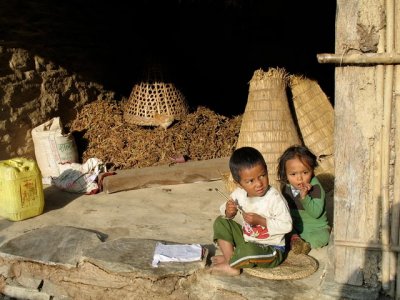 I can’t help but contrast this experience of service with our own culture where “customer service” is a role to be adorned rather than a genuine reflection of deep respect and sincere desire to help others. Even the phrase “customer service” reflects a consumer mentality rather than a sincere way of life. I wonder if respect for the other is lost when a culture becomes so self-absorbed that it becomes entirely normal to, for example, post innumerable posed pictures of ourselves on Facebook followed by sound bytes about what we are doing every minute of the day.
I can’t help but contrast this experience of service with our own culture where “customer service” is a role to be adorned rather than a genuine reflection of deep respect and sincere desire to help others. Even the phrase “customer service” reflects a consumer mentality rather than a sincere way of life. I wonder if respect for the other is lost when a culture becomes so self-absorbed that it becomes entirely normal to, for example, post innumerable posed pictures of ourselves on Facebook followed by sound bytes about what we are doing every minute of the day.
Do we also lose a grounded sense of ourselves when our language becomes so disconnected from our internal realities that we begin to sound like hyperventilating robots? Take for example, my experience in Chicago on my way home, when the waitress asked me how I enjoyed breakfast. When I responded that it was good, she responded with an exclamatory, hyped up “fantastic.”
Day 3
On the 3rd day of trekking I found myself sprawled flat on my back on the rock floor of a high mountain village, wondering if marijuana might make the trek easier. There certainly was plenty of it growing in the fields. Within seconds, a questionable porter approached me with an offer. The rest of the afternoon was fantastic! (ha, ha
Day 4
The quality of our trekking began to seriously decline. Lodging turned into 2 “beds” on a cement floor, with no electricity and no running water, in frigid temperatures. The “toilet” was a communal shit hole in an outhouse. Our conversations spiraled down to the basics of “toilet talk.” Lilly’s happiness was dependent on her ability to go to the bathroom, and mine was dependent on the ability to stop going to the bathroom.
Lilly and I found the universal language of “love” could entertain our guides for hours on end. They wanted to know if we were married, had children, had boyfriends, etc. We promised Vishnu that we would find him a girlfriend on the trek. He told us he was looking for a foreigner who could speak English and was 5 ft. tall so that if need be, he could carry her. The height requirement presented some challenge as we picked out foreign potentials. When we spotted the perfect girl, Vishnu refused to talk to her, so our efforts were fruitless.
Our conversations turned into chopped up monosyllabic phrases, a semi-unconscious mimicking of our guides’ English, as though somehow they might better understand us if we spoke like them.
I began to use my bamboo walking sticks to drag me up each rock step in a slow, painfully laborious process. That evening I did my daily stretches against a support pole holding up the lodge roof and I nearly brought down an entire wing of the lodge, when the beam lost it’s footing on the ground.
Entertainment in the evenings was refreshingly simple and self-reliant. A handful of tourists and a number of very tired porters gathered in make shift dining rooms, kept warm by a dangerous gas torch perched by our feet under the table. Some of the porters slept on mattresses around the perimeter of the room, huddled together to keep warm, while the rest of us passed pen and paper around the group to play tic-tac-toe and other line games. Amusingly, porters huddled behind us seriously intent on learning the art of tic-tac-toe. By the end of the evening, we resorted to writing our names and phrases in the English alphabet and letting our guides translate them into the Nepali script. We passed many a cold evening like this.
Once in a while, when lying in bed, I resorted to listening to Perry Como Christmas songs on my Ipod. Normally I don’t like to listen to music when traveling because I do not travel to tune out my surroundings with the familiarities of home. However, high in the Himalayan mountain villages that are accessible only by days of walking, I needed a dose of home. The music brought me both tantalizing close to home and yet so impossibly far away.
Day 5
Mountains at last!
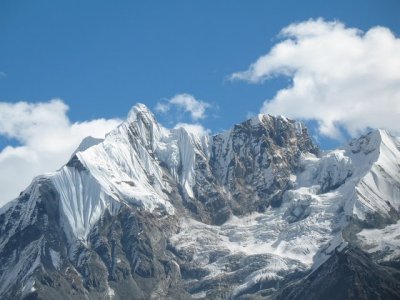 Most of our time was spent trekking through what felt like foggy abysses – deeply disappointing for a trek that I had originally planned to be in the heart of the Himalayas at peak season during typically bright and clear, blue days.
Most of our time was spent trekking through what felt like foggy abysses – deeply disappointing for a trek that I had originally planned to be in the heart of the Himalayas at peak season during typically bright and clear, blue days.
Within 2 hours of reaching Annapurna base camp, our destination for breath taking 360 degree snowcapped beauty, we had to make a difficult judgment call. The weather was turning sour, a snowstorm was expected, and we had limited time to hike out given our international flight schedule. Do we turn around and give up on standing “inside” the Himlayas? We were so tantalizing close, and so disappointingly but necessarily ready to turn around. Fortunately, we decided to continue and if it became apparent that we would not see the mountains we would immediately turn around.
I sprinted up that mountain to Annapurna Base Camp in pure desperation, arriving in half the normal time, to excellent weather.
Lilly mentioned to me that she travels to “find herself.” Originally I thought that it would be impossible to miss yourself against these mountains. Their quiet, towering, self assured presence naturally beckons me inward. But now I realize that it’s all to easy to miss ourselves, because in the end we can’t move mountains, only mountains can move us. So many trekkers along the way seemed determined to move those mountains, in the sense that they were resolved to hike to the “best peak,” the “best view,” and get up for the “best sunrise.” This sort of “checklist travel” ends in innumerable photos in various poses, in front of the Taj Mahal, the Himalayas, the Mona Lisa, etc. But we cannot plan when or where we will be touched.
Annapurna Base Camp was stunningly beautiful, and surprisingly I can still feel the quiet, unwavering presence of those mountains, but at the time, I did not feel particularly moved. Five days of 8 hour hikes up mountains, pressure to take in Annapurna Base camp in just 2 hours before the weather turned, kept me distant from those mountains, in my own world, not deeply touched. I can’t imagine normally living life like these “checklist travelers,” on a superficial plane, snapping pictures. Not once on the entire trek did I ever see a trekker standing alone, pausing, or marveling. What, in the end, do they take from the experience besides the chance to boast about a trek in the Himalayas?
My unplanned moment of being moved by the mountains occurred at an inferior base camp at an inferior time. Standing outside alone under the full moon, I felt these mountains. Keepers of the night, glistening in white light, protecting … I was moved to tears.
Day 6
 Vishnu promised us a party at Annapurna base camp if we found him a girlfriend. However, instead of a “girlfriend party” we had a “rat party” all night long with my bag of trail mix on the ground at the foot of my bed. Lilly woke me up to tell me the news, and although I remember nothing of this the next day, she said I responded “That’s okay. Let them eat.”
Vishnu promised us a party at Annapurna base camp if we found him a girlfriend. However, instead of a “girlfriend party” we had a “rat party” all night long with my bag of trail mix on the ground at the foot of my bed. Lilly woke me up to tell me the news, and although I remember nothing of this the next day, she said I responded “That’s okay. Let them eat.”
The rats moved Lilly to desperation, and one can’t reason with desperation. She wanted “out,” right now, right then, and she was willing to hike all day and all night to get “out.” Fortunately, the human ability catches up and we had to stop to eat and by the end of 8 hours, she agreed that continuing would be too much.
On travels like this, I think it’s better to miss the details. Lilly saw details that I never even noticed. Rats crossing our path on the trek, rats at night, loads of floating gunk in our drinking water, dead insects on the sheets…
Day 7
Finally beautiful weather! Everything changes in sunlight. The mountains glisten, the trees sparkle, and finally there is context. We could see where we had hiked to and where we were hiking from. Yes, this was a beautiful trek, but for the most part we could only see it during the first hour or so of every day before clouds descended.
We were told that weather this year (and the last 3 years) has been entirely unpredictable, with 2 seasons instead of 4. In the past, the monsoon season always started and ended on the same day, every year. But now the monsoon season is variable and winter entirely unscheduled. There was no fall, so we missed the blue skies. I can’t help but wonder how the instability of weather around the globe will affect cultures. Weather fundamentally shapes a culture’s experience of life and the rhythms of nature are one of the ingredients for making meaning. With constant unpredictability, how will cultures around the globe change?
By Day 7, I was quickly approaching 16 consecutive meals of Dal Bhat, breakfast excluded. Rice and lentils is the “poor man’s food” – “24 hour power” according to our guides. I stubbornly persisted on eating Dal Bhat for lunch and dinner despite a wide array of menu items, mostly because my guides told me they had been eating Dal Bhat every day of their lives, once in the morning and once in the evening, with only tea in between. I figured I owed it to my experience to at least try out 16 consecutive meals.
Day 8
I don’t normally recount my life with goals or accomplishments. But this trek has definitely been the most physically enduring accomplishment of my life. I can’t help but feel proud.
Today we said goodbye to our guides. We had developed a temporary friendship, almost unavoidable when singing and joking 8 hours a day. But never in my wildest dreams could I have predicted what was to happen today.
Vishnu had fallen in love with Lilly and wanted to marry her. Yam informed me of this as we hiked together on the way down the mountain. He pointed up to Vishnu who was attentively following Lilly close in her tracks a little further up the path, almost like a child trying to keep up with his mother while at the same time also trying to get her attention.
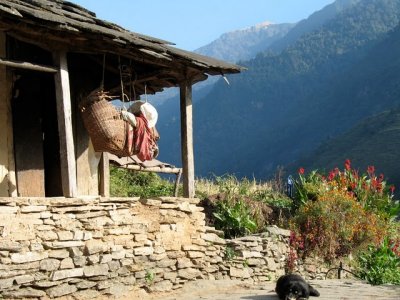 I was speechless. Never did I imagine our friendship and joking would lead to this. But suddenly I could see the clues through Vishnu’s eyes. We had joked that Lilly was looking for a boyfriend. In fact we said we would find Vishnu a girlfriend if he found Lilly a boyfriend. A few days ago Vishnu had changed his girlfriend requirements from English speaking to also Spanish speaking. Yesterday evening he treated the four of us to a bottle of rum, an expense I cringe to think about on his salary. Just yesterday Vishnu had been quizzing me about Visas and country differences. “How hard was it to get a Visa to ‘South America?’ How about to North America? How hard was it to get a job in South America and North America? What were the differences between the South and the North?” Poor Vishnu had a lot to learn about his geography.
I was speechless. Never did I imagine our friendship and joking would lead to this. But suddenly I could see the clues through Vishnu’s eyes. We had joked that Lilly was looking for a boyfriend. In fact we said we would find Vishnu a girlfriend if he found Lilly a boyfriend. A few days ago Vishnu had changed his girlfriend requirements from English speaking to also Spanish speaking. Yesterday evening he treated the four of us to a bottle of rum, an expense I cringe to think about on his salary. Just yesterday Vishnu had been quizzing me about Visas and country differences. “How hard was it to get a Visa to ‘South America?’ How about to North America? How hard was it to get a job in South America and North America? What were the differences between the South and the North?” Poor Vishnu had a lot to learn about his geography.
I told him about how my sister-in-law was only able to come to the US after she was engaged. In retrospect, perhaps this wasn’t the most helpful story to share.
Yam wanted me to talk to Lilly about Vishnu’s love for her. In hindsight perhaps I should have told Yam that Vishnu should talk to her himself, but that also would have been unnecessarily leading him on. So whether I liked it or not, I became the “middleman” in this love affair.
When we took a break, I quickly passed Lilly and under my breath told her “Vishnu te qiere y quiere casarte.” She didn’t believe me. It took awhile to convince her. In the meantime, Vishnu had clearly deduced that I was speaking on his behalf about his love for Lilly. When he saw that Lilly wasn’t responding positively, the dynamics between our guides changed for the rest of the day. Vishnu took off and he asked Yam to follow him (going against the training that guides receive in which one guide must always stay behind the trekkers). Our interactions became awkward and stilted.
Lilly asked me not to mention to Yam that I had spoken with her about Vishnu’s love, making me once again the hapless “middleman,” a role that I did not want. I felt awkward since it was clear to everyone that I had spoken to Lilly. While Lilly did not want to hurt Vishnu, I think it would have been better to carry my liaison role through to the end and relay to Yam that Lilly wasn’t interested. Cut it off right then and there.
So alas, we parted awkwardly. The joking and fun abruptly over. And I felt keenly the contrast been tourist and guide. We shared 8 fun days together, but in the end the light “friendship” was temporary, and all that mattered was the tip. Their futures were reliant on the bonuses from trekkers. Would Vishnu save enough for his University education? Would Yam save enough to start a family next year? The realities of the tourist and the guide would never merge. At most they had 8 days of temporary respite from their difficult lives.
And in the end…
As I sit in the comfort of my apartment, reflecting on the past 2.5 weeks of whirlwind travel, I am aware that reading about a place half way across the globe is so different from experiencing the place. I imagine that from afar the descriptions sound exotic. We easily let our imaginations take the words even further into the realm of unreal. But when I am traveling, the environment seems as natural to that country as home is to us. The way people abroad live their lives is as normal to them as the way we live our lives in the U.S.. Our imaginations can easily distance us from others as we try to make sense of the foreign. But after every trip I realize how much we have to learn from people around the world. Contrasts provide the lens for me to see afresh my own culture and the perspective to choose just how I wish to live my life, hopefully applying the best of what I have learned.


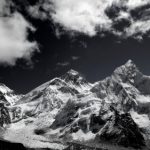

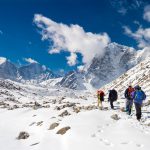
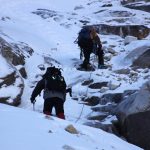


Leave a Reply